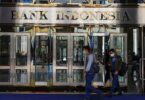HONG KONG (AFP/ APP): Equities struggled Wednesday after a brief respite from last week’s painful rout across world markets, with recession fears continuing to build as central banks hike interest rates to combat decades-high inflation.
While Asia, Wall Street and Europe all enjoyed healthy gains on Tuesday, analysts warned the downbeat mood on trading floors means the selling is unlikely to end any time soon.
Fears about a global contraction have also put downward pressure on oil prices, despite China’s reopening moves, the US holiday driving season and tight supplies.
Federal Reserve boss Jerome Powell’s two-day testimony to Congress this week will be pored over for an idea about officials’ plans for fighting runaway prices, which are being fanned by supply chain snarls, China’s lockdowns and the war in Ukraine.
Most observers expect them to hike rates by three-quarters of a point several more times this year, having announced such a move in June — the sharpest lift in almost 30 years.
However, while many believe the Fed’s front-loaded tightening drive is needed — allowing it to begin cutting sooner as price rises settle back — there is a building consensus that the world’s top economy is heading for a contraction next year.
“The Fed has entered into a policy cocktail that we would describe as hammer time,” Gene Tannuzzo, at Columbia Threadneedle Investments, told Bloomberg Television. “You have to be planning defensively at this point. There are a lot of questions on all risk assets.” In early Asian trade, Hong Kong, Singapore, Sydney, Seoul, Taipei, Jakarta and Manila all fell, while Tokyo and Shanghai were barely moved. There were small gains in Wellington.
Stephen Innes at SPI Asset Management said that while the selling from last week had abated, traders continued to fret over a recession and the prospect of more rate hikes, adding that the Fed could be more compelled to respond if oil prices surge again and push up inflation further.
“Even more worryingly from a policy perspective is that virtually every recession in the past three decades has been a function of a demand shock, but this is a supply shock; hence monetary policy is less potent,” he added.
“Despite the uptick in risk sentiment, it still feels we are eons away from shaking the event-driven bear market blues due to prevailing recession obsession headwinds.”
Oil prices were feeling the heat from recessionary fears, with both main contracts down more than three percent Wednesday, though Goldman Sachs said that with demand still outpacing supplies, the market remains tight.“Investors should remember that Fed-induced slowdowns are simply a short-term abatement of the symptom, inflation, and not a cure for the problem, underinvestment,” it added.
Bets on the Fed’s rate hikes, and the Bank of Japan’s refusal to move from its policy of ultra-low rates, continues to pile pressure on the yen, which is sitting at a 24-year low above 136.50 to the dollar.
Japanese Prime Minister Fumio Kishida’s comment that it “is up to the central bank” how to maintain its easy money policy adding to pressure on the country’s unit though famed economist Nouriel Roubini said he expects Tokyo to take action if the yen hits 140.
“If you go well above 140, the BoJ will have to change policy and the first change in policy is going to be yield curve control,” he said referring to a policy of keeping long-term rates artificially at a chosen level. “So I think another 10 percent fall in the yen will imply a change in policy,” he told Bloomberg Television at the Qatar Economic Forum.






